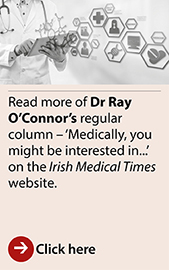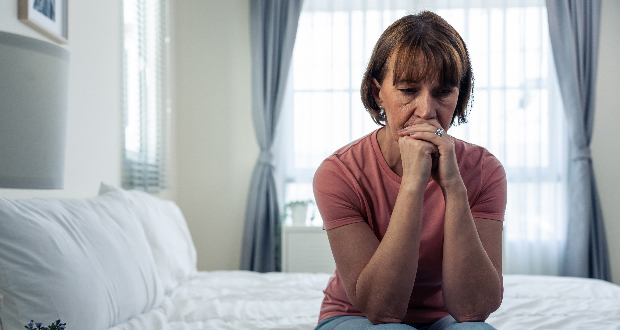Dr Ray O’Connor takes a look at the latest clinical studies on mental health
Anxiety
Social Anxiety Disorder (SAD) is highly prevalent and debilitating disorder. Treatments exist but are not accessible and/or helpful for all patients, indicating a need for accessible treatment alternatives. The aim of this randomized, clinical trial1 was to evaluate internet-delivered psychodynamic therapy (IPDT) with and without therapist guidance, compared to a waitlist control condition, in the treatment of adults with SAD.
Dr Ray O’Connor
The authors tested whether IPDT was superior to await list control, and whether IPDT with therapeutic guidance was superior to unguided IPDT. Participants were recruited nationwide in Sweden. Eligible participants were ≥18 years old and scoring ≥ 60 on the Liebowitz Social Anxiety Scale. Included participants were randomly assigned to IPDT with guidance (n = 60), IPDT without guidance (n = 61), or waitlist controls (n = 60).
The IPDT intervention comprised eight self-help modules based on affect-focused dynamic therapy, delivered over eight weeks on a secure online platform. The primary outcome was SAD symptoms severity measured weekly.
Primary analyses were calculated on an intention-to-treat basis. The findings were that unguided IPDT was superior to waitlist on depressive symptoms and general anxiety, but not on emotion regulation, self-compassion or quality of life. Guided IPDT was superior to unguided PDT on depressive symptoms, with a trend towards superiority on a measure of generalized anxiety.
At six and twelve month follow-up there were no significant differences between guided and unguided IPDT. This finding increases the range of accessible and effective treatment alternatives for adults suffering from SAD.
Depression
Major depressive disorder is a leading cause of disability worldwide and has been found to lower life satisfaction more than debt, divorce, and diabetes and to exacerbate comorbidities, including heart disease, anxiety, and cancer.
Although people with major depressive disorder often respond well to drug treatments and psychotherapy, many are resistant to treatment. The objective of this systematic review and network meta-analysis2 was to identify the optimal dose and modality of exercise for treating major depressive disorder, compared with psychotherapy, antidepressants, and control conditions.
 The authors concluded that exercise is an effective treatment for depression, with walking or jogging, yoga, and strength training more effective than other exercises, particularly when intense. Yoga and strength training were well tolerated compared with other treatments. Exercise appeared equally effective for people with and without comorbidities and with different baseline levels of depression.
The authors concluded that exercise is an effective treatment for depression, with walking or jogging, yoga, and strength training more effective than other exercises, particularly when intense. Yoga and strength training were well tolerated compared with other treatments. Exercise appeared equally effective for people with and without comorbidities and with different baseline levels of depression.
In fact, physical activity is effective across a wide range of psychological illnesses. The authors of this overview of systematic reviews3 concluded that it is highly beneficial for improving symptoms of depression, anxiety and distress across a wide range of adult populations, including the general population, people with diagnosed mental health disorders and people with chronic disease.
They recommend that physical activity should be a mainstay approach in the management of depression, anxiety and psychological distress.
However, 20-30 per cent of patients fail to achieve adequate therapeutic response to currently available depression treatments. Digital therapeutics, such as computerized cognitive–emotional training interventions, represent a promising new strategy for treating major depressive disorder (MDD).
This randomized, double-blind, controlled study4 from a few years ago looked at the efficacy of a digital cognitive–emotional training intervention designed to enhance cognitive control for emotional information-processing.
Fifty-one participants with MDD in a current major depressive episode were randomly assigned to participate in the study which involved 18 sessions over six weeks, or an active control condition (n = 23).
The findings were that ten of 28 cognitive emotional training participants achieved clinical response (≥50 per cent reduction in symptoms) compared to four of 23 in the control group. Both groups exhibited similar, small improvements in working memory. The authors concluded that cognitive emotional training may be a feasible and effective intervention strategy for MDD, but future studies to elucidate its mechanism of action are warranted.
Non pharmacological augmentation can also be considered for treatment resistant depression. The objective of this study5 was to compare the effectiveness of augmentation with aripiprazole or repetitive transcranial magnetic stimulation versus switching to the antidepressant venlafaxine or duloxetine for treatment-resistant depression.
The study found that repetitive transcranial magnetic stimulation augmentation was shown to be more effective than switching antidepressants in treatment-resistant depression on the study’s primary measure. In light of these findings, they opined that clinicians should consider repetitive transcranial magnetic stimulation augmentation in such patients.
In another small trial of 70 patients6, transcranial direct current stimulation (tDCS) was found to be helpful in treating the symptoms of anhedonia in depression.
Drugs for depression are widely available but these seem to have limited efficacy, can have serious adverse effects, and are associated with low patient adherence. Importantly, the treatment effects of antidepressant drugs do not appear until 4-7 weeks after the start
of treatment, and remission of symptoms can take months. Additionally, the likelihood of relapse is high, with 40-60 peer cent of people with depression experiencing a further depressive episode, and the chance of relapse increasing with each subsequent episode.
Since the early 2000s, the naturally occurring serotonergic hallucinogen psilocybin, found in several species of mushrooms, has been widely discussed as a potential treatment for depression. Psilocybin’s mechanism of action differs from that of classic selective serotonin reuptake inhibitors (SSRIs) and might improve the treatment response rate, decrease time to improvement of symptoms, and prevent relapse post-remission.
The aim of this systematic review and meta-analysis7 was to determine the efficacy of psilocybin as an antidepressant compared with placebo or non psychoactive drugs. The authors concluded that treatment effects of psilocybin were significantly larger among patients with secondary depression,
when self-report scales were used to measure symptoms of depression, and when participants had previously used psychedelics. Further research is thus required to delineate the influence of expectancy effects, moderating factors, and treatment delivery on the efficacy of psilocybin as an antidepressant.
Finally, the Health Services Executive website8 gives a good summary of what alternatives are available for management of depression. This is very helpful to refer to in cases of resistant depression in practice. ![]()
References:
- Mechler J et al. Guided and unguided internet-delivered psychodynamic therapy for social anxiety disorder: A randomized controlled trial. NPJ Mental Health Res 3, 21 (2024). https://doi.org/10.1038/s44184-024-00063-0
- Noetel M et al. Effect of exercise for depression: systematic review and network meta-analysis of randomised controlled trials. BMJ 2024;384:e075847 http://dx.doi.org/10.1136/bmj‑2023‑075847.
- Singh B et al. Effectiveness of physical activity interventions for improving depression, anxiety and distress: an overview of systematic reviews. Br J Sports Med 2023;0:1–10. doi:10.1136/bjsports-2022-106195.
- Lacoviello B et al. A randomized, controlled pilot trial of the Emotional Faces Memory Task: a digital therapeutic for depression. NPJ Digital Medicine (2018) 1:21 ; doi:10.1038/s41746-018-0025-5.
- Papakostas G et al. Comparative effectiveness research trial for antidepressant incomplete and non-responders with treatment resistant depression (ASCERTAIN-TRD) a randomized clinical trial. Molecular Psychiatry; https://doi.org/10.1038/s41380-024-02468-x (March 2024).
- Kong S et al. Efficacy of transcranial direct current stimulation for treating anhedonia in patients with depression: A randomized, double-blind, sham-controlled clinical trial. J Affect Disord 2024 Apr 1:350:264-273. doi: 10.1016/j.jad.2024.01.041. Epub 2024 Jan 15.
- Metaxa A et al. Efficacy of psilocybin for treating symptoms of depression: systematic review and meta-analysis. BMJ 2024;385:e078084 http://dx.doi.org/10.1136/bmj‑2023‑078084 (March 2024).
- Health Services Executive Ireland. Clinical Depression Treatment https://www2.hse.ie/conditions/clinical-depression/treatment/ (accessed 14/05/2024).
